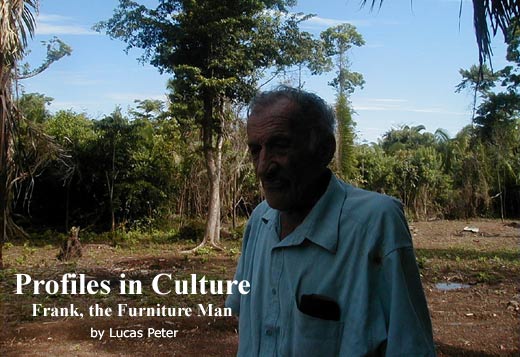
|
I first went looking for the furniture man of Toledo in the weekly Saturday vegetable market on Front Street in the seaside town of Punta Gorda about a month shy of the annual start of the Belizean rain season in June. Everyone in PG as well as in Toledo district wide said that he designed and manufactured some of the best furniture in all of Belize. My wife and I were interested in getting a King-size bed built in a real hurry, having us running about in a mindset most folks will explain won't get you to far in Belize. Regardless of the local realities, my wife and I were especially in a hurry in light of the fact that I had unintentionally blackened her left eye with my right elbow rolling over in our double bed late one night during a thunderous rainstorm. After enduring a week or so of people looking at me in sheer disgust and disdain as though I was a convicted wife beater, I consented, no I insisted, in seeking out Mr. Derkits, the furniture man of the Toledo District of Belize who had for close to the last fifty years became the legendary maker of Belizean furniture. So this day in the market I turned to my friend Pablo Bochub, the owner and operated of Pablo's Taxi Company as well as Roots and Herbs Travel & Tours. You can usually find Pablo trolling the streets for patrons, which each market day brings Pablo and his taxi to the corner just opposite the vegetable market there on Front Street in Punta Gorda town. As I discussed my furniture needs with Pablo, my entrepreneur taxi driving tour guiding friend explained that in the Toledo District there were really only a handful of places and craftsmen where one could go to make arrangements to purchase custom designed and manufactured wood furniture. According to Pablo, there were the Mennonites in the village of Pine Hill over near Indian Creek; there was an unnamed local man in the village of Boom Creek; and then there was "a German man" named Frank Derkits. As Pablo explained, only Frank used wood glue to hold his furniture together, the others relied upon the hammer and nails. Before we separated that day taxi side in the Front Street market, Pablo promised that since my wife and I did not own furniture nor a car and since Mr. Derkits lived in the village of Mafredi some fifteen miles outside of Punta Gorda, he assured me that he would pass along a word or two on my behalf. And so not a week went by until one day a small framed man about four foot eleven in his early eighties walked up from the roadside into our bush camp. Originally not from Germany but from Stegersbach, a village in eastern Austrian, Frank came to Belize in 1954 after his release from a US Prisoner of War camp in Paris Texas. According to Mr. Derkits, in the immediate days following his days during World War II as a former soldier in the Army of Hitler’s Germany, Mr. Derkits was captured and turned over to the American coalition forces where he was sent to the prisoner of war facilities just outside of Paris Texas, USA. From the POW camp in Paris, Frank spent time in Mexico before accepting a job with a Texas oil exploration company that brought him further south to then British Honduras. In time Mr. Derkits got into the logging business and over the years Mr. Derkits readily admits that he has made as well as loss a lot of money in Belize. During the last half of the 20th century Mr. Derkits has controlled and loss control over vast regions of forest from the Cayo to Toledo. He can relay tales of fortune as well as hardship, from business partners that took advantage of illness to the ravages of Hurricane Iris that left a half a million dollar Belgian milling saw in pieces. Frank will tell you the friend hurt him more than the hurricane, more so even than the hand that was closed to severed and now deformed when men under his own supervisions failed to heed his cries to turn off the power to the saw answer. Today Frank will tell you he has all the business he can handle, especially shipping quality furniture to the high dollar rollers in Placencia and points around the world. Frank also says he has no one in line to take up his craft and that it will probably die with him. The years show plainly upon the facial lines of Frank. He harbors some hope of returning to his home village in Austria for his time is up. |

